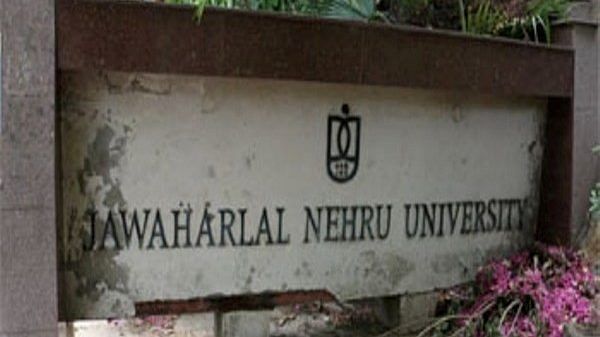New Delhi: Jawaharlal Nehru University (JNU) is set to unveil two new academic centres on July 24, the Kusumagraj Special Centre for Marathi Language, Literature and Culture and the Shri Chhatrapati Shivaji Maharaj Special Centre for Security and Strategic Studies.
The inauguration ceremony will be led by Maharashtra Chief Minister Devendra Fadnavis at the JNU Convention Centre, in the presence of Deputy Chief Ministers Eknath Shinde and Ajit Pawar, along with other senior cabinet ministers from the state.
In an interview with PTI on Monday, JNU Vice-Chancellor Santishree Dhulipudi Pandit highlighted the importance of the two new centres as a reflection of the National Education Policy (NEP), 2020 and the university’s commitment to promoting Indian knowledge systems and languages.
On the launch of the Marathi centre, she said, “The present state government is giving importance to Marathi, which has been declared by the Centre as one of the classical languages, also because Marathi is a language of great repute and know for its literature.” The Kusumagraj Special Centre will focus on Marathi language, literature and cultural traditions and is named after the iconic Marathi poet and Jnanpith awardee.
“Kusumagraj is one of the greatest Marathi poets who won the Jnanpith award as well. He is a poet of emancipation and social equality, so it (the centre) is named after him and here, Marathi language, literature and culture will be the main focus,” Pandit said.
The centre will offer postgraduate and certificate-level programmes to promote multilingualism and cultural understanding. “It will offer MA in Marathi and certificate courses to go with the NEP for non-Marathi speakers like those who speak Tamil. A lot of students from Bihar and Uttar Pradesh have opted for Tamil and there are many who speak Tamil whenever we have functions. This is encouraging because this will unite India and make people more sensitive to other languages of the country,” the VC said.
Students from across disciplines and states will be encouraged to take part. “Like any student of PG or PhD can simultaneously do these certificate courses in Marathi and this will give an opportunity to all because JNU has students from all states. We will also have conferences,” she noted.
Pandit further stressed the cultural importance of Marathi traditions and their contributions to India’s civilisational history.
“You also know about the great Varkari movement, which was a people’s bhakti movement for the first time in the history of India, where caste did not play a role at all. It was a very egalitarian, common people’s movement. Panduranga in Pandharpur, Varkari literature — it is important that all over the country, people understand this great culture, literature and language,” she said.
The Shri Chhatrapati Shivaji Maharaj Special Centre for Security and Strategic Studies will explore indigenous strategic traditions based on the Maratha empire. The centre is envisioned to become a hub for military history, strategy and future policy development rooted in India’s past.
“It is very important that icons like Chhatrapati Shivaji Maharaj are honoured by India’s topmost university,” Pandit said.
She elaborated on the historical gaps the centre intends to address. “The other centre is to honour one of India’s greatest forgotten heroes and that is Chhatrapati Shivaji Maharaj, an unsung hero. Chhatrapati Shivaji Maharaj is thought to be a great strategist, so we are looking at the strategies used by the Marathas, who formed a very large empire,” she added.
Pandit underlined that many people are unaware of the full expanse of Maratha power. “They ruled Delhi for 30 years. Many people do not know that Marathas ruled Delhi and they went as far as Lahore…. In south, they went up till Thanjavur,” she said.
The JNU VC added that the centre will not only study history, but also offer insights for contemporary security thinking.
“You know that defence institutes are under JNU — the NDA, the Indian Naval Academy and others — so the present Army chief and Navy chief are JNU alumni and we also want to have a strategic future policy for India, how we can develop courses using the tactics of Chhatrapati Shivaji Maharaj, Kanhoji Angre and several of his generals, naval as well as guerrilla warfare, because it is very relevant in today’s strategy,” she said.
While military personnel will not be formally trained at the centre, they will be involved in lectures and academic contributions.
“They will come to give lectures and many already have. We give them degrees. Basically, JNU guides them in their academics. Many of them will come here, so it will be a mixture of both theory and practice…. It is about how to use the past to help in future strategy,” Pandit said.
Optional courses at the centre will begin this semester. “The Chhatrapati Shivaji Maharaj Centre was planned more than one-and-a-half years back. An amount of Rs 10 crore has already come for it and work has started…. Optional courses will be floated from this semester, which students will take, and also PhD theses in this area will be encouraged,” the VC said.
JNU also plans to host national-level dialogues under the new centres. “We are proposing a Sindhudurg dialogue, where we might call the best thinkers in strategy, and also for Marathi literature and language, where translations will be encouraged, where works of Marathi will be translated into Indian languages,” Pandit added.
With the launch of these centres, JNU aims to deepen the academic study of Indian traditions, while contributing to a modern, knowledge-driven society, in line with the NEP, 2020, she said. PTI MHS RC
This report is auto-generated from PTI news service. ThePrint holds no responsibility for its content.
Also read: Thane food stall owner beaten ‘for not speaking in Marathi’




